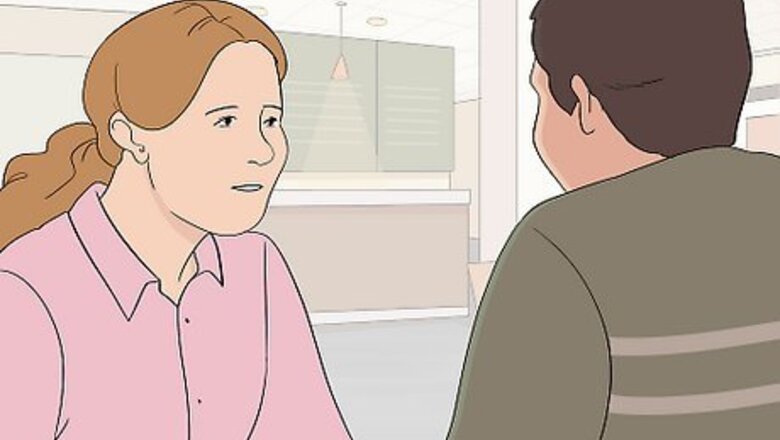
views
Giving a Definitive “No”
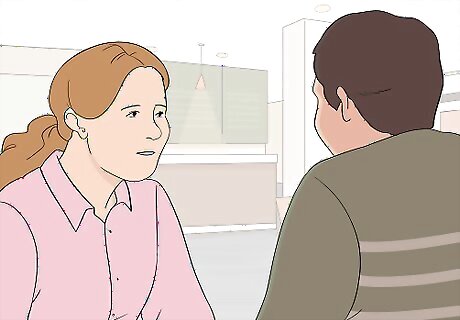
Communicate your wishes clearly. Once you know that you don’t want to be friends, it’s important to say so. You don’t need to rationalize your feelings. Particularly if you were the person who was dumped, you are under no obligation to explain yourself. Keep it short and sweet. Simply say, “I’m sorry, but I don’t actually want to be friends with you,” or, “No. Being friends isn’t going to work for me.” Don’t make promises or offers for the future. Sure, you might end up being friends again at some point, but there’s no reason to promise that now. Don’t say anything like, “Let’s check back in in six months,” or, “I’ll let you know when I’m ready.” Statements like this keep you tied to the person and can prevent you from moving on. If you were the person who initiated the breakup, you can say something like, “I know this is hard, but I don’t think trying to be friends would be good for either of us,” or, “I can understand wanting to be friends, but I can’t do that.” If you're afraid that your ex might hurt themselves or you, you can suggest resources that could help them. You may want to give them the number of a grief counselor or therapy center. You can say, "I can't help you through this, but here are the numbers of professionals who can." You can also alert their friends or family that they may need the extra support right now. Reader Poll: We asked 528 wikiHow readers who've broken up with their partner, and only 5% of them agreed that you should suggest staying friends. [Take Poll] Trying to stay friends with an ex can lead to avoidable confusion and pain.

Have a conversation for closure, if possible. Sometimes, a relationship ends and you feel that you’ve gotten whatever kind of closure you need. However, in some situations, you may still feel that you have unanswered questions, or unresolved feelings. Having a final conversation can sometimes help clarify feelings, and make saying no to a friendship easier. With closure, you may find that you no longer feel the need for a friendship. That’s because you’re no longer using the promise of friendship as a way to get the answers you feel you need. The other person may not be interested in a conversation. In this case, you may need to talk to a counselor or to close friends in order to process your feelings and move on. Have the conversation in a place and time where you can have privacy and not be rushed. Exchanging thoughts and feelings via e-mail or letters can also be helpful.
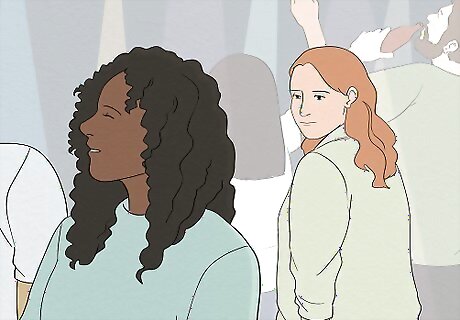
Establish new boundaries. It’s likely not enough to simply say, “I don’t want to be friends.” You need to also be clear about what your new boundaries will be. This will vary depending on how intertwined your lives are. Remember that it’s okay to make strong demands. For example, you can say, “I don’t want you attending any party or event where you know I will be.” Your ex may not be willing to accept your terms, but you should begin the negotiation by at least being clear about what your ideal situation is. If you live together, one of you should move out as soon as possible. Continuing to live together perpetuates unhealthy dynamics and prevents both of you from moving on. You don’t want to be friends with your ex, so why would you want to live with them? If your ex is dependent on you financially, you may need to reach out to their friends or family and ask them to help support your ex right now. If you're able to, you may offer your ex a nominal sum of money to help them support themselves for a short period, provide care for your children, or pay for a temporary place to live. In marriages with prenuptial agreements, the details of an arrangement like this will have already been settled.
Refraining from Contact

Create guidelines for unavoidable contact. If you have children or pets together, work together, or share a social circle, there will likely be times that contact is unavoidable. Make a clear plan that you can both agree to for how to handle those times. Take control of the situation by clearly stating your needs. Keep in mind though, that you may need to negotiate. For example, you may never want to see your ex again, but if you work together, you may need to say something like, “I understand that you need to keep working here, so we’ll have to interact occasionally. I can do that, but I won’t be engaging with you socially at work, and please don’t visit my department unless it’s unavoidable.” If you have children together, you’ll need to establish boundaries around custody, holidays, milestones (such as graduations), and family gatherings. If you feel strongly averse to interacting with your ex at all, you may need to seek the help of a family counselor or lawyer. Write down the guidelines you’ve both established so you have something to reference if there’s a misunderstanding later.
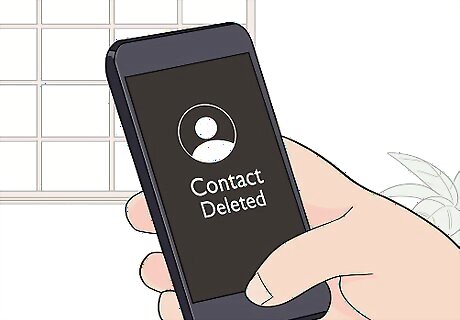
Refrain from contacting them. This may be difficult, particularly if you still don’t feel closure, or if you’re deeply heartbroken. It’s natural to want to reach out or to find reasons to contact your ex. However, do your best to cut off all contact until you’ve had time to heal. It can help to delete their number from your phone. This can help prevent impulsive calling or texting. If you feel the need to contact them, spend some time writing in a journal instead. You can write them an imaginary letter, or write out out how you’re feeling. This can help you process feelings without actually reaching out to them. If you feel the urge to contact your ex, call a friend instead and tell them how you’re feeling. Avoid going to places you know you might run into them. Stay away from the bars and coffee shops they frequent, even if it means changing your usual routine. Don’t walk home using the route that goes right by their house.
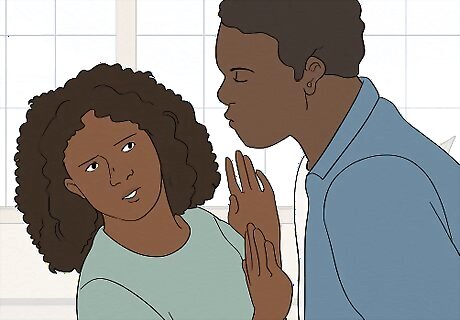
Ignore flirtation or mixed signals. Your ex may reach out to you, even if you’ve explicitly asked them not to. They may even send flirtatious messages or indicate that they’re still interested in you. Do not respond to this. It’s disrespectful of the boundaries you’ve established and to your healing process. Your ex may use flirtation as a way to manipulate you to reestablish contact. Unless they have explicitly said that they want try to get back together on terms that you could agree to, do not respond to their messages. If you're afraid that your ex might stalk, harass, or threaten you, seek support from a domestic violence shelter. You also may want to contact law enforcement or file a restraining order. Remember that “friends with benefits” has the word “friends” in it.
Healing from the Breakup
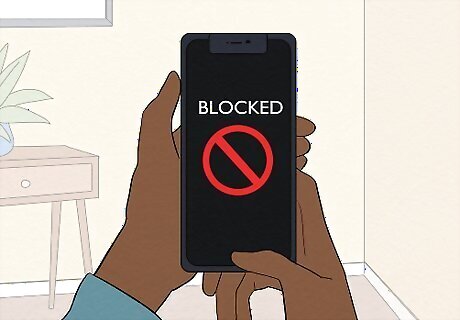
Unfollow them on social media. Seeing their latest posts will only bring up old feelings and remind you of your ex’s existence. You may need to unfollow them, or even block them, if necessary. Even if you think that seeing them on social media is no big deal, consider how you’ll feel if they begin posting photos of them with their new date. Some people find it useful to get off of social media completely following a breakup. You may choose to do a “social media fast” for a week, a month, or more. This can help you focus on your own life and accomplishments without worrying about seeing pictures or mentions of your ex.

Reconnect with yourself. Now that the relationship is over, you likely have more time to do things that you enjoy on your own or with friends. Get back to hobbies that you haven’t had time for recently. Call up a friend you haven’t seen in a while and do something fun together. Exercise, time outdoors, and time spent doing something you love are great ways to reconnect with yourself. It can feel lonely at first to spend time by yourself, but it’s important to get back to feeling good being on your own. Spend time with loved ones and close friends. When we spend time with people who care about us, it helps us reconnect with who we are separate from a previous relationship.
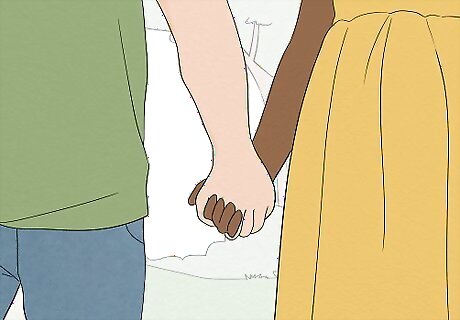
Begin dating again. This might take a long time, depending on how long and how serious the relationship was. Make sure to wait until you’re really ready, but when you are, it’s good to take steps toward finding a new relationship that’s right for you. Online dating apps can help you find other people who are looking for something similar. For example, if your last relationship was a long and serious one, you may just be looking for short-term, casual dating right now. Many apps can help you find others looking for that, too. If your last relationship ended because you were looking for marriage and a family and your partner wasn’t ready, online apps can help you identify other people who are also looking for something serious. Be honest with people you date about what you’re going through. You don’t need to burden them with too much information, but you can say something like, “I got out of a serious relationship fairly recently. I’m still doing some processing about that, but I’m also really excited to be dating again.”
















Comments
0 comment